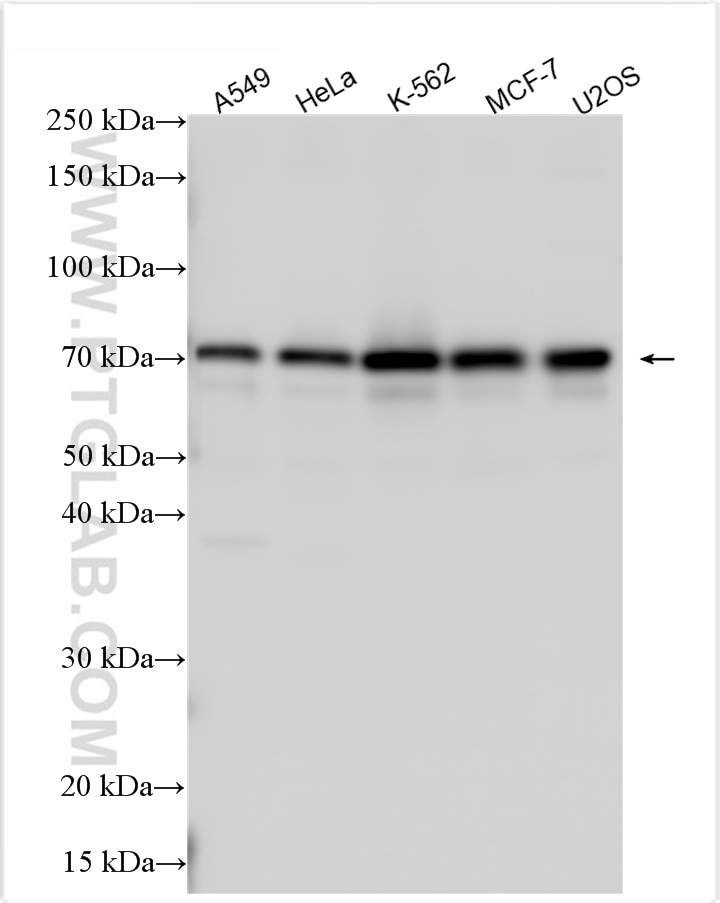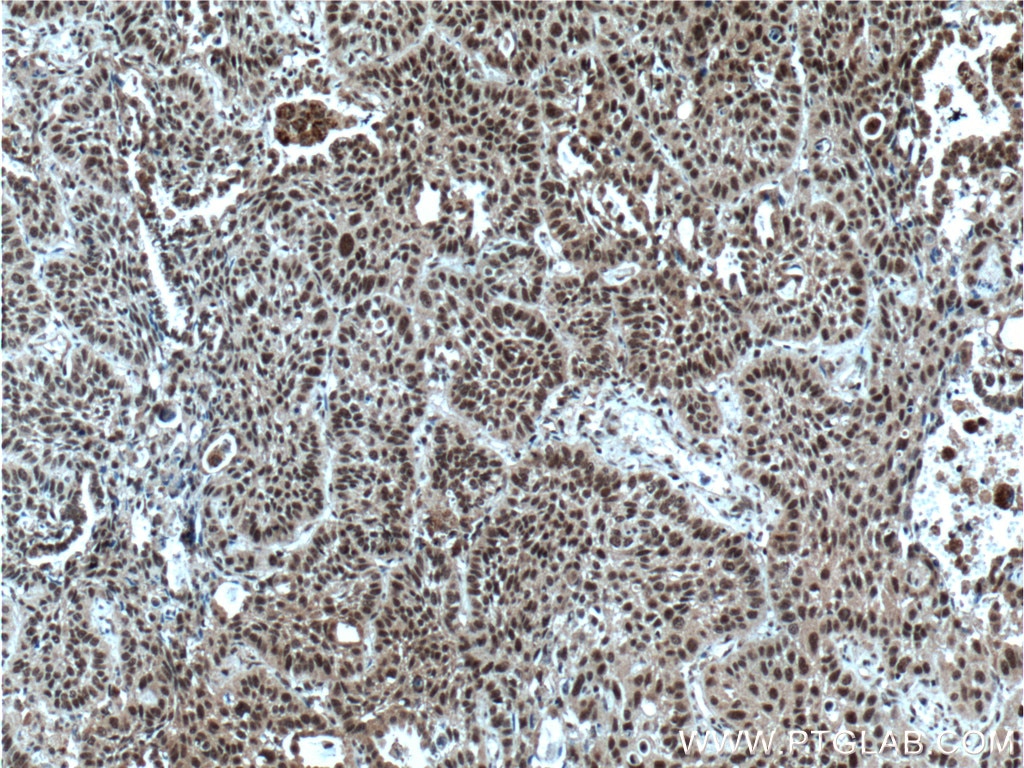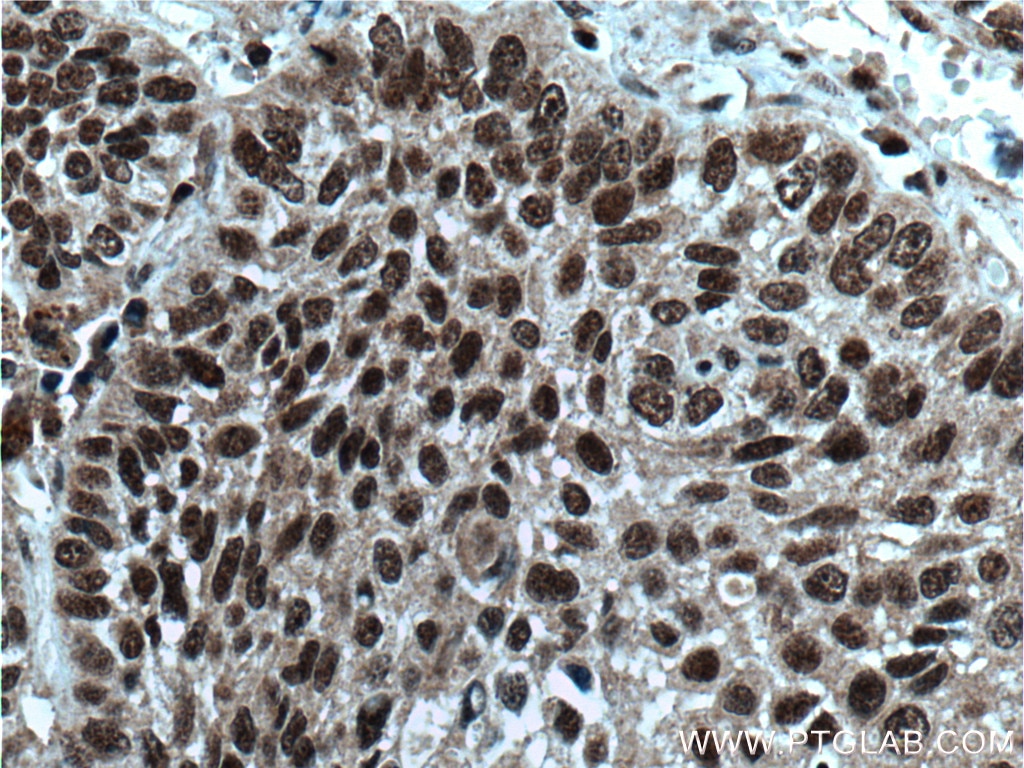Tested Applications
| Positive WB detected in | A549 cells, HeLa cells, K-562 cells, MCF-7 cells, U2OS cells |
| Positive IHC detected in | human lung cancer tissue Note: suggested antigen retrieval with TE buffer pH 9.0; (*) Alternatively, antigen retrieval may be performed with citrate buffer pH 6.0 |
Recommended dilution
| Application | Dilution |
|---|---|
| Western Blot (WB) | WB : 1:500-1:2000 |
| Immunohistochemistry (IHC) | IHC : 1:50-1:500 |
| It is recommended that this reagent should be titrated in each testing system to obtain optimal results. | |
| Sample-dependent, Check data in validation data gallery. | |
Published Applications
| WB | See 3 publications below |
| IHC | See 1 publications below |
Product Information
16393-1-AP targets BANP in WB, IHC, ELISA applications and shows reactivity with human samples.
| Tested Reactivity | human |
| Cited Reactivity | human, mouse |
| Host / Isotype | Rabbit / IgG |
| Class | Polyclonal |
| Type | Antibody |
| Immunogen |
CatNo: Ag9484 Product name: Recombinant human BANP protein Source: e coli.-derived, PGEX-4T Tag: GST Domain: 119-460 aa of BC009424 Sequence: VRCAVPGRRQNTIVVKVPGQEDSHHEDGESGSEASDSVSSCGQAGSQSIGSNVTLITLNSEEDYPNGTWLGDENNPEMRVRCAIIPSDMLHISTNCRTAEKMALTLLDYLFHREVQAVSNLSGQGKHGKKQLDPLTIYGIRCHLFYKFGITESDWYRIKQSIDSKCRTAWRRKQRGQSLAVKSFSRRTPNSSSYCPSEPMMSTPPPASELPQPQPQPQALHYALANAQQVQIHQIGEDGQVQVIPQGHLHIAQVPQGEQVQITQDSEGNLQIHHVGQDGQVLQGAQLIAVASSDPAAAGVDGSPLQGSDIQVQYVQLAPVSDHTAGAQTAEALQPTLQPEMQ Predict reactive species |
| Full Name | BTG3 associated nuclear protein |
| Calculated Molecular Weight | 545 aa, 59 kDa |
| Observed Molecular Weight | 72 kDa |
| GenBank Accession Number | BC009424 |
| Gene Symbol | BANP |
| Gene ID (NCBI) | 54971 |
| RRID | AB_2061101 |
| Conjugate | Unconjugated |
| Form | Liquid |
| Purification Method | Antigen affinity purification |
| UNIPROT ID | Q8N9N5 |
| Storage Buffer | PBS with 0.02% sodium azide and 50% glycerol, pH 7.3. |
| Storage Conditions | Store at -20°C. Stable for one year after shipment. Aliquoting is unnecessary for -20oC storage. 20ul sizes contain 0.1% BSA. |
Protocols
| Product Specific Protocols | |
|---|---|
| IHC protocol for BANP antibody 16393-1-AP | Download protocol |
| WB protocol for BANP antibody 16393-1-AP | Download protocol |
| Standard Protocols | |
|---|---|
| Click here to view our Standard Protocols |
Publications
| Species | Application | Title |
|---|---|---|
Hum Mol Genet TBN improves motor function and prolongs survival in a TDP-43M337V mouse model of ALS. | ||
Oncotarget The suppressing effects of BTG3 expression on aggressive behaviors and phenotypes of colorectal cancer: An in vitro and vivo study. | ||
Gerontology BANP Participates in the Chronic Intermittent Hypoxia-Induced Senescence of Vascular Endothelial Cells by Promoting P53 Phosphorylation and Nuclear Retention |








